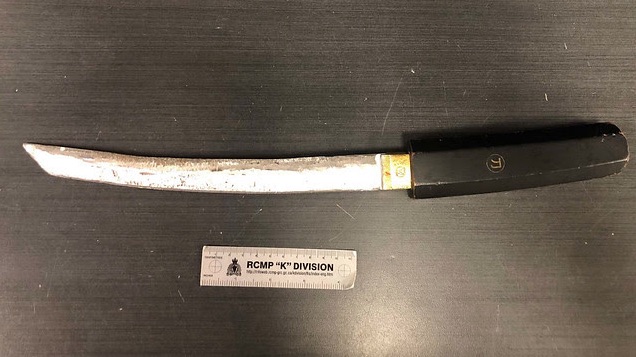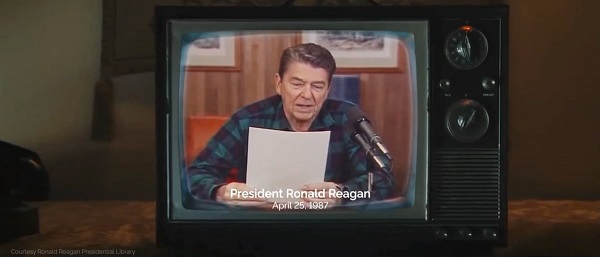Crime
RCMP say 29 year old Red Deer suspect shot by officer was carrying this weapon

News release from Alberta Serious Incident Response Team (ASIRT)
Investigation into RCMP officer-involved shooting causing injury continues
On Sept. 21, the Alberta Serious Incident Response Team (ASIRT) was directed to investigate a Royal Canadian Mounted Police (RCMP) officer’s discharge of his service weapon during an encounter with a 29-year-old man that day.
At about 6:08 p.m., Red Deer RCMP received a 911 call reporting a break and enter in progress at a residence in the Maxwell Avenue area by a 29-year-old man known to the homeowner. At approximately 6:10 p.m., Red Deer RCMP officers arrived on the scene and entered the residence.
Shortly thereafter, the officers confronted the man inside the residence. During the encounter, an officer discharged his service weapon, injuring the man who was able to retreat into another room. Not long after, the man surrendered and was taken into custody without further incident.
Officers on scene provided emergency first aid to the man until Emergency Medical Services (EMS) arrived and took over care before transporting the man to hospital. The man was assessed, treated and discharged from hospital back into police custody.
The civilian reporter has confirmed that he heard commands to drop a weapon prior to shots being fired. A bladed weapon was recovered at the scene. The injured man has confirmed that at the time of the officer-involved shooting, he was in possession of this weapon, which he referred to in the interview as either a “knife” or a “sword.” While this evidence provides some context for the event, there is considerably more work to be done. It remains to be established what, if anything, the man may have done with the weapon; what the officers, including the officer who discharged his firearm, observed; and what prompted the use of potentially lethal force.
ASIRT’s investigation will examine the circumstances surrounding the police officer’s discharge of his firearm. The RCMP retains responsibility for the investigation into the man’s conduct. No additional information will be released.
ASIRT’s mandate is to effectively, independently and objectively investigate incidents involving Alberta’s police that have resulted in serious injury or death to any person, as well as serious or sensitive allegations of police misconduct.
—————————————————-
News release from Red Deer RCMP
Red Deer RCMP officer involved shooting – Update #1
The Red Deer RCMP have laid charges in relation to the Sept. 21, 2021, officer involved shooting incident that took place at a residence in the area of Maxwell Avenue in Red Deer.
Scott Bruno (29) of Red Deer is charged with:
· Assault peace officer with a weapon
· Enter dwelling house without lawful excuse and commit indictable offence
· Fail to comply with probation
Following a judicial hearing on Sept. 22, 2021, Bruno was released on cash bail; however, was remanded pending payment of bail.
He is scheduled to attend Red Deer Provincial Court on Sept. 24, 2021.
As this matter is now before the courts, no further details can be provided by the RCMP.
All media inquiries about the officer involved shooting incident should continue to be directed to ASIRT at 780-641-9099.
Business
Quebecers want feds to focus on illegal gun smuggling not gun confiscation

The Canadian Taxpayers Federation released new Leger polling showing that half of Quebecers say the most effective way to reduce gun crime is to crack down on illegal gun smuggling from the United States, not a federal gun ban and confiscation.
“Law enforcement experts say the best way to make Canada safer is to stop illegal gun smuggling and Quebecers say exactly the same thing,” said Nicolas Gagnon, CTF Quebec Director. “It makes no sense to pour hundreds of millions into a confiscation that only takes guns from lawfully licensed gun owners.”
In 2020, the federal government launched its policy to confiscate thousands of so-called “assault-style” firearms from licensed gun owners. Ottawa recently announced a pilot project in Cape Breton to start taking firearms from individual owners.
The Leger poll asked Quebecers what they think is the most effective way to reduce gun crime. Results of the poll show:
- 51 per cent say introducing tougher measures to stop the illegal smuggling of guns into Canada from the United States
- 37 per cent say banning the sale and ownership of many different makes and models of guns along with a government buyback program
- Six per cent say neither of these options
- Seven per cent do not know
The results of the polls arrived as recorded remarks from Public Safety Minister Gary Anandasangaree made headlines in September.
In a leaked audio recording, the minister suggested the confiscation program is being pushed in part because of voters in Quebec, while also expressing doubt that local police services have the resources to enforce it.
Police organizations have long warned Ottawa’s confiscation program is misguided. The RCMP union says it “diverts extremely important personnel, resources, and funding away from addressing the more immediate and growing threat of criminal use of illegal firearms.”
The program was first estimated to cost $200 million. Just providing compensation for the banned guns, not including administrative costs, could cost up to $756 million, according to the Parliamentary Budget Officer.
Premiers of Alberta and Saskatchewan have both publicly said that they would not cooperate with Ottawa’s gun ban. Premier François Legault has stayed silent on this issue.
“Quebecers have been clear: the real problem is illegal gun smuggling, not law-abiding firearms owners,” said Gagnon. “The police have also made it clear the gun confiscation will waste money that could be used to stop criminals from committing gun crimes.
“Legault needs to stand up for Quebec taxpayers and refuse to help implement Ottawa’s costly and ineffective confiscation scheme. The federal government needs to drop this plan and focus its resources on intercepting illegal guns at the border: that’s how you actually make communities safer.”
Courageous Discourse
No Exit Wound – EITHER there was a very public “miracle” OR Charlie Kirk’s murder is not as it appears

By John Leake
Turning Point Spokesman: “No Exit Wound a Miracle”
Charlie Kirk Show producer Andrew Kolvet repeats extremely dubious claim purportedly made by “the surgeon who operated on Kirk.”
Monday Blaze Media (relatable with Allie Beth Stuckey) reported the following:
Turning Point USA spokesman and executive producer of the “Charlie Kirk Show” Andrew Kolvet revealed new details about the shooting that even doctors are calling a miracle. According to Kolvet, the surgeon who operated on Kirk claimed that the high-velocity bullet was powerful enough to kill multiple large animals — and “should have gone through” his body. But for some reason, Kirk’s body was able to stop it.
“I want to address some of the discussion about the lack of an exit wound with Charlie,” Kolvet wrote in a post on X.
“The fact that there wasn’t an exit wound is probably another miracle, and I want people to know,” Kolvet continued, explaining that he had spoken with the surgeon who worked on Charlie in the hospital.
“He said the bullet ‘absolutely should have gone through, which is very very normal for a high powered, high velocity round. I’ve seen wounds from this caliber many times and they always just go through everything. This would have taken a moose or two down, an elk, etc,’” he recalled.
“But it didn’t go through. Charlie’s body stopped it,” he added.
When he mentioned to the doctor that there were “dozens of staff, students, and special guests standing directly behind Charlie” when he was shot, the doctor reportedly replied, “It was an absolute miracle that someone else didn’t get killed.”
“His bone was so healthy and the density was so so impressive that he’s like the man of steel,” Kolvet recalls the doctor saying.
This is not a credible statement, and it raises a number of concerns.
It strikes me as very perplexing that a “surgeon operated on Kirk,” because in the video of the shooting, Charlie reacted with a decorticate posture—that is, an abnormal body posture characterized by flexion of the upper limbs—caused by severe trauma to the central nervous system. This indicates that the bullet either directly struck his cervical spinal cord, or the shock wave of the supersonic bullet passing near his spinal cord traumatized it.
A 150-grain, .30-06 bullet’s energy at 150 yards from the muzzle varies by ammunition, but a common hunting cartridge has an estimated value of approximately 1,800-2,000 foot-pounds (with the bullet traveling at about 2500 feet per second). In other words, the .30 caliber (.30 inch diameter) metal projectile struck his neck with sufficient kinetic energy to move a 2,000 pound mass a linear distance of one foot.
If the bullet that struck Charlie’s cervical spinal cord was a .30-06 fired from 150 yards away, it would have:
1). Severed his spinal cord, killing him instantly.
2). Passed through his neck.
Note that the cervical vertebrae are supported by strong muscles and have high compressive strength, but are far too delicate to stop a .30-06 bullet traveling at 2,500 feet per second.
If ALL of the kinetic energy of the bullet was absorbed by Charlie’s neck, it would have done spectacular trauma to his neck, as distinct from producing the clean bullet hole visible in the video footage that ruptured his Carotid artery.
Though I appreciate that some may find a supernatural explanation to be consoling, it seems to me that the investigation should not rest on the this explanation.
As I wrote a few weeks ago: If I were investigating the murder, I would consider the hypothesis that Charlie was shot with a weapon equipped with a suppressor and loaded with a subsonic cartridge to further reduce the sound. I have seen footage of someone firing a rifle with this setup, and the shot was amazingly quiet. The effective range of such a weapon is about 100 yards or less, and the shooter must be very skilled.
However, such a setup could fire a subsonic projectile that would penetrate a human neck without passing through it. In this scenario, the actual assassin (firing the suppressed rifle) hypothetically coordinated the timing of his shot with someone else firing a normal (supersonic and loud) rifle cartridge into the air at the same time to create a distraction or red herring.
In a functioning society in which the people trust their authorities—including their medical examiners—it would be easy to discover what happened and to disclose at least a preliminary report that would satisfy most reasonable people. The trouble our Republic is facing now is that so many of us no longer trust our federal and state authorities to tell us the truth.
For example, we have strong grounds for suspecting that medical examiners are not diligently investigating (with the proper analytic methods) unexpected, fatal cardiac arrests in young people to determine if they were caused by vaccine-induced myocarditis.
Subscribe to FOCAL POINTS (Courageous Discourse).
For the full experience, upgrade your subscription.
-

 Alberta17 hours ago
Alberta17 hours agoBusting five myths about the Alberta oil sands
-

 Business21 hours ago
Business21 hours agoQuebecers want feds to focus on illegal gun smuggling not gun confiscation
-

 Health20 hours ago
Health20 hours agoNew report warns WHO health rules erode Canada’s democracy and Charter rights
-

 Energy19 hours ago
Energy19 hours agoMinus Forty and the Myth of Easy Energy
-

 Fraser Institute18 hours ago
Fraser Institute18 hours agoMétis will now get piece of ever-expanding payout pie
-

 Business2 days ago
Business2 days ago‘TERMINATED’: Trump Ends Trade Talks With Canada Over Premier Ford’s Ronald Reagan Ad Against Tariffs
-

 Business1 day ago
Business1 day agoTrump Admin Establishing Council To Make Buildings Beautiful Again
-

 Business16 hours ago
Business16 hours agoCarney government risks fiscal crisis of its own making








